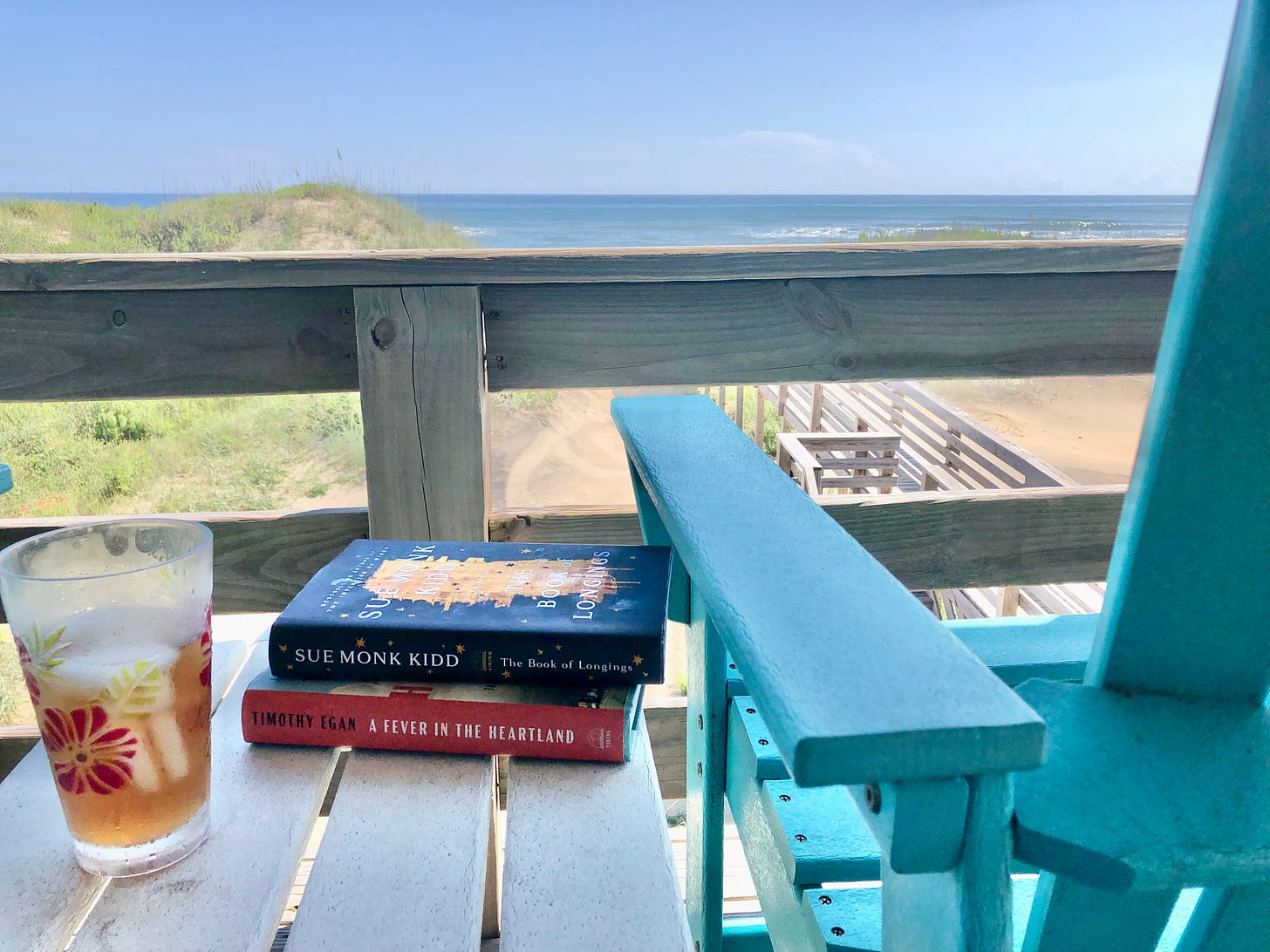At the beginning of each new grade, teachers at my elementary school gave the same homework assignment. Write a report about what you read on summer vacation. I was a book-girl, and I couldn’t wait to share.
For the last ten days, I’ve been at the beach and have read two books — Timothy Egan’s A Fever in the the Heartland: The Ku Klux Klan’s Plot to Take Over America, and the Woman Who Stopped Them and Sue Monk Kidd’s The Book of Longings.
Egan’s Fever is narrative non-fiction, a compelling historical account of the growth of the Klan in the 1920s in Indiana and the murder of a young white woman who resisted the sexual advances of their powerful leader. Kidd’s Book is a novel, a fictitious tale of a Jewish teenage girl named Ana who becomes Jesus’ wife and their marriage.
Both are great reads. Egan and Kidd are gifted writers and bring their subjects and stories to life, one as a lively and informative history and the other a moving and smart work of historical fiction.
Fever in the Heartland, traces how D.C. Stephenson, a shady conman, rose to lead the powerful midwestern Klan, a story of deception, authoritarian manipulation, racism, police misconduct, and political corruption that pre-figured the rise of Donald Trump and MAGA that echoes our own time.
Egan’s book is harrowing on many levels, but one thing in particular stood out: it reveals how easily white pastors and churches were enlisted by the Klan, and that “good” Protestant church people knowingly — and willingly — chose to hate their Black, Jewish, and Catholic neighbors. Egan also traces the resistance to the Klan, how hard it was to speak out, what it cost, and the damage done by the Invisible Empire — and the courage of one woman, Madge Oberholzer, to tell the truth to end the terror.
The Book of Longings is more of a traditional “beach read,” a page-turning novel focused on a female character and an improbable love story. In this case, the unlikely romance is also an historical one, the nearly thwarted lovers being Ana, the teenage daughter of a wealthy Roman collaborator betrothed to a much-older widower, and Jesus, an eighteen-year-old itinerant carpenter who hears the voice of God. Sue Monk Kidd vividly recreates the cosmopolitan city of ancient Sepphoris and impoverished Nazareth — as well as Alexandria and Jerusalem. She is adept with first century Jewish rituals, politics, Roman culture, and religious customs and controversies.
There’s a lot of history here and she’s done her homework, making it a pleasure to read. The story imagines the missing years of Jesus’ life before he started his ministry — and leans into a question that puzzles many biblical scholars: Was Jesus married? It would have been highly unusual for a devout Jewish man in his time not to have a wife. Kidd takes this on and creates a beautiful pair of young lovers drawn together by longing — for each other, for God, for voice and words, and to become their truest selves. She charts all this through a theology of Jesus’ humanity and feminist spirituality. (In other words, this book was written for me! 🙂)
But Longings is harrowing, too. Imagine what it was like to be a young woman fighting for a voice, seeking one’s own inner truth in a world where you are the property of men. There’s her extended and emotionally intolerable, even abusive, betrothal arranged by her greedy father. And Longings also has a sexual assault — one so brutal that I had to put the book down. All of the best characters in the story are outcasts, men and women struggling at the margins of power in ancient Palestine, more victims than agents of their own lives.
And finally, take just a moment and imagine that you are married to Jesus! Would you find yourself, or lose yourself in a different way? Despite all the liberties Kidd takes with Jesus’ story, she doesn’t fiddle with the ending. This romantic beach read doesn’t end happily — sort of — but ends as it should with the lovers finding lives “begging to be born,” even beyond death and suffering.
For as eclectic a pair these two books seem on the surface, I realized that the central story in both draws from the same source — Fever and Longings are both extended critiques of patriarchy. Of course, Egan’s book is about racism and religious bigotry, but his history demonstrates that the heart of the Klan was hatred, control, and abuse of women. There was no separating threads of race and patriarchy, they were a single, ugly cloth. (This is an incredibly relevant observation for today’s politics in everything from the rape allegations made against Donald Trump to mass shooters previously known to be domestic abusers.)
If God is male, then male is God.
— Mary Daly
Not unlike the women of ancient Rome about whom Kidd writes, the women in Egan’s account are either wives or whores — and neither is safe from violence. In Indiana, the only woman with power is a female evangelist named Daisy Barr, a.k.a., “Mother,” who was enlisted to give the Klan a sheen of female moral authority and to enlist Protestant church women to the cause (and she got rich doing it). “Good” women were wives, members of the female organization of the Klan, complicit with its ideals and methods, raising their children into the world of white supremacy. Complicity did not necessarily mean safety — as many Klan wives would come to understand — for all women were objects to be used and abused at will.
Ultimately, the heroes of both books are women who find a voice. Madge Oberholzer finds hers on her deathbed; Ana discovers hers upon her husband’s death. Although these women were victimized by patriarchy, they refuse to be victims of it. They rise above patriarchy, seizing their destinies through WORDS that speak truth into the world.
And, thus, I find myself sitting on a porch looking out over the ocean and thinking of patriarchy, of courage, of words.
My own story finds itself in echoes of Madge and Ana — with authoritarian pastors, professors, bosses, and ex-es manipulating or mansplaining or managing me into complicity and compliance and submission — to speak their words and not my own. I feel myself grateful for the men who also resisted patriarchy. The brave journalists and lawyers in Egan’s book; and Lavi (a fictional character) and Jesus in Kidd’s. Jesus never inhibited Ana’s voice — Jesus insisted she follow it. Ana loved that Jesus. I love him, too.
I think about Priscilla — and wonder if she really wrote the Book of Hebrews. And who, really, was the “beloved disciple” in John’s Gospel? I remember Margaret Fell’s Women’s Speaking: Justified, Proved and Allowed of by the SCRIPTURES, All such as speak by the Spirit and Power of the Lord JESUS, written in 1666, pleading for women’s right to preach. I cried at the recent book (and film), Women Talking, about Christian women who dare to tell secrets. So many words unsaid, so many uncredited, so many unwelcome, so many unheeded. Sometimes it seems that western history is a long conspiracy of silence. How powerful are female voices that they inspire so much fear over these centuries?
An ocean roaring, yet still unheard.
INSPIRATION
I am the first and the last
I am she who is honored and she who is mocked
I am the whore and the holy woman
I am the wife and the virgin
I am he the mother and the daughter
I am the limbs of my mother
I am a sterile woman and she has many children
I am she whose wedding is extravagant and I didn’t have a husband….
I am the silence never found
And the idea infinitely recalled….
….I am a barbarian among barbarians….
I am a foreigner and a citizen of the city….
I am the one who prepares the bread and my mind within…
— Anonymous, from The Thunder: Perfect Mind, an ancient text from Nag Hammadi that appears in Kidd’s The Book of Longings
Blizzards of paper
in slow motion
sift through her.
In nightmares she suddenly recalls
a class she signed up for
but forgot to attend.
Now it is too late.
Now it is time for finals:
losers will be shot.
Phrases of men who lectured her
drift and rustle in piles:
Why don't you speak up?
Why are you shouting?
You have the wrong answer,
wrong line, wrong face.
They tell her she is womb-man,
babymachine, mirror image, toy,
earth mother and penis-poor,
a dish of synthetic strawberry ice cream
She grunts to a halt.
She must learn again to speak
starting with I
starting with We
starting as the infant does
with her own true hunger
and pleasure
and rage.
— Marge Piercy, “Unlearning Not to Speak”
SOUTHERN LIGHTS IS BACK!
January 12 -14, 2024
And our theme is Reimagining Faith Beyond Patriarchy and Hierarchy
Last January, almost 700 people gathered at St. Simon’s Island in Georgia for a packed weekend of poetry, theology, and music.
WE’RE GOING TO DO IT AGAIN!
YOU ARE INVITED to join me and Brian McLaren as we reimagine our faith beyond patriarchy and hierarchy in our interior lives, in our communities of faith, and in the Scriptures. We’ve asked three remarkable speakers to take us through this journey: Cole Arthur Riley, Simran Jeet Singh, and Elizabeth “Libbie” Schrader Polczer.
Please come and be with us in Georgia. Or, if you’d rather be with us online, you can choose that option as well.
MORE INFORMATION AND REGISTRATION CAN BE FOUND HERE.





Diana, A member of my faith community had just told me about "The Book of Longings." She had read it and wanted to discuss it with a group of people, which we are going to do in November. I am reading it now. I wanted to know if you had any resource to recommend that would help with the feminist theology references in the book? I know and am picking up on many but am sure I'm missing others. That is intriguing to me and will be important for our discussion. Thanks.
At this moment I have that ache in the middle of my chest when I am impacted by something emotionally very painful. I grieve beyond expression over how women have suffered since . . . how far back? All due to treatment by slightly less than half of the human race. That portion to which I belong. That being said, I am in awe of womanhood!